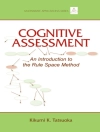A comprehensive approach to accurate ADHD diagnosis
In Essentials of ADHD Assessment in Children and
Adolescents, the authors provide a clear and informative road
map for practitioners seeking to conduct state-of-the-art
assessments for one of the most common disorders of childhood.
Drawing upon years of experience in conducting diagnostic
evaluations of ADHD following best-practice standards, they
emphasize the importance of a comprehensive evaluation,
incorporating data from multiple sources, using multiple methods,
and interpreting findings within the appropriate developmental and
cultural contexts. The major components of an ADHD evaluation
(interviews, rating scales, cognitive testing, observation, record
review) are reviewed in detail.
Expert guidance is provided for resolving the most common
challenges in assessing ADHD, including differentiating symptoms
from normal development, dealing with discrepant data, differential
diagnosis, and considering comorbidity. The latest scholarly
literature is integrated with the authors’ practical
recommendations to provide clinicians with the concepts and tools
needed for effective and accurate assessment of ADHD, addressing
such topics as:
* When inattention is ADHD, and when it may be emotional or
neurological
* Which disorders may masquerade as or present with ADHD
* The elements of accurate ADHD testing and the reasons behind
them
* Integrating results of a multi-modal approach into an ADHD
assessment
An indispensable professional resource for practicing
clinicians, Essentials of ADHD Assessment for Children and
Adolescents is a reader-friendly guide to providing a thorough,
responsible ADHD evaluation.
Tabla de materias
Foreword xi
Series Preface xiii
Preface xv
Acknowledgments xix
One Understanding ADHD 1
Historical Perspective 2
Overarching Principles 8
Core Features 11
Associated Features and Comorbidity 14
Etiology 20
Epidemiology 25
Summary 30
Test Yourself 30
References 32
Two What the DSM-5 Says About ADHD 45
Organization of the DSM-5 46
DSM-5 Criteria for ADHD 49
How Do I Know if It Is DSM-5 ADHD? 64
Summary 64
Test Yourself 65
References 67
Three Assessing ADHD: Goals and Guiding Principles 69
Goals 70
Guiding Principles 78
Summary 99
Test Yourself 100
References 102
Four Components of ADHD Assessment 107
Sequence of Evaluation Components 109
Record Review 111
Interview 113
Clinical Observation 125
Rating Scales 128
Cognitive Testing 133
Summary 148
Test Yourself 149
References 150
Five Putting It All Together: Integrating Findings and Drawing Conclusions 154
Clinical Application of the DSM-5 Criteria for ADHD 155
Differential Diagnosis and Comorbidity 163
Dealing with Discrepant Data 179
Beyond Diagnosis 183
Summary 186
Test Yourself 187
References 189
Six Illustrative Case Reports 191
Psychological Evaluation 194
ADHD Evaluation Report 223
Neuropsychological Evaluation 245
Annotated Bibliography 275
About the Authors 277
Index 279
Sobre el autor
ELIZABETH P. SPARROW, Ph D, is a pediatric
neuropsychologist in Raleigh, North Carolina, with expertise in
diagnosis and treatment planning for ADHD in children, adolescents,
and young adults. Dr. Sparrow wrote the Essentials of Conners
Behavior Assessments, co-authored the Guide to Assessment
Scales in ADHD, Second Edition, and co-edited Executive
Function and Dysfunction: Identification, Assessment, and
Treatment.
DREW ERHARDT, Ph D, is a clinical psychologist and
professor in the Graduate School of Education and Psychology at
Pepperdine University. In addition to writing numerous journal
articles and chapters on the nature, assessment, and treatment of
ADHD, Dr. Erhardt co-authored the Conners Adult ADHD Rating Scale
and served on the editorial board of the Journal of Attention
Disorders.












